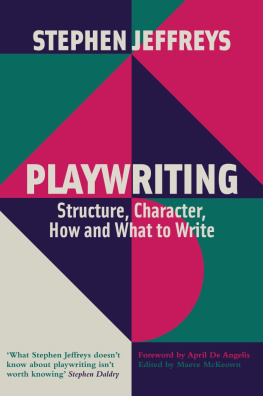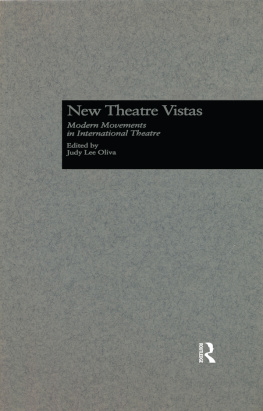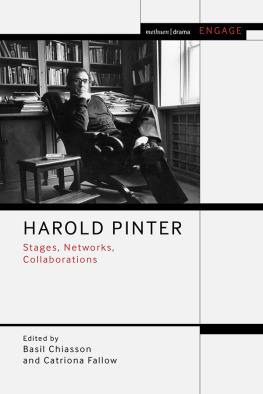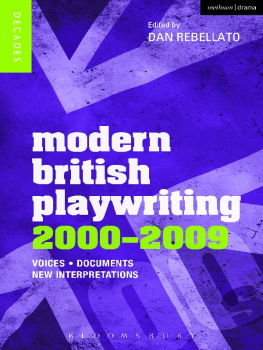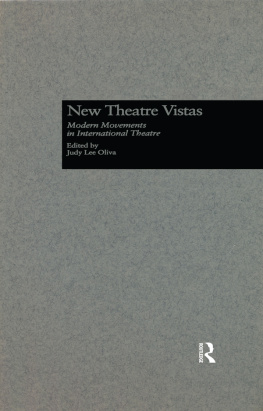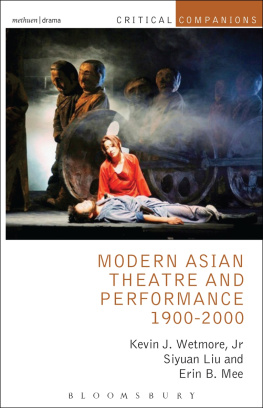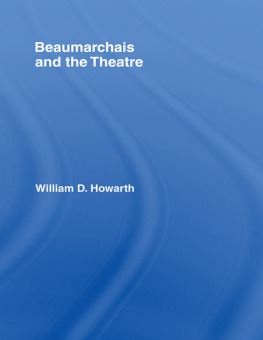VOICES, DOCUMENTS, NEW INTERPRETATIONS
David Pattie is Professor of Drama at the University of Chester, UK. He is the author of The Complete Critical Guide to Samuel Beckett (Routledge, 2001) and Rock Music in Performance (Palgrave, 2007), and he co-edited a collection of essays on Kraftwerk (Kraftwerk: Music Non-Stop, Continuum, 2010). He has published extensively on a wide range of topics, including Samuel Beckett, contemporary writing for the stage, Scottish theatre and culture, political theatre, popular music and popular culture.
MODERN BRITISH PLAYWRITING: THE 1960s
by Steve Nicholson
Includes detailed studies of works by John Arden, Edward Bond, Harold Pinter and Alan Ayckbourn
MODERN BRITISH PLAYWRITING: THE 1970s
by Chris Megson
Includes detailed studies of works by Caryl Churchill, David Hare, Howard Brenton and David Edgar
MODERN BRITISH PLAYWRITING: THE 1980s
by Jane Milling
Includes detailed studies of works by Howard Barker, Jim Cartwright, Sarah Daniels and Timberlake Wertenbaker
MODERN BRITISH PLAYWRITING: THE 1990s
by Aleks Sierz
Includes detailed studies of works by Philip Ridley, Sarah Kane, Anthony Neilson and Mark Ravenhill
MODERN BRITISH PLAYWRITING: 20002009
by Dan Rebellato
Includes detailed studies of works by David Greig, Simon Stephens, debbie tucker green, Tim Crouch and Roy Williams

Methuen Drama
First published in Great Britain in 2012 by Methuen Drama
This electronic edition published in 2012 by Bloomsbury Publishing Plc
Methuen Drama, an imprint of Bloomsbury Publishing Plc
Methuen Drama
Bloomsbury Publishing Plc
50 Bedford Square
London WC1B 3DP
www.methuendrama.com
Copyright 2012 by David Pattie
General Preface copyright 2012 Richard Boon and Philip Roberts
T. S. Eliot copyright 2012 by Sarah Bay-Cheng
John Osborne copyright 2012 by Luc Gilleman
Arnold Wesker copyright 2012 by John Bull
The rights of the authors to be identified as the editors of these works have been asserted by them in accordance with the Copyright, Design and Patents Act, 1988
eISBN 978 1 4081 5956 9
Available in the USA from Bloomsbury Academic & Professional, 175 Fifth Avenue /3rd Floor, New York, NY 10010.
A CIP catalogue record for this book is available from the British Library
All rights reserved
You may not copy, distribute, transmit, reproduce or otherwise make available this publication (or any part of it) in any form, or by any means (including without limitation electronic, digital, optical, mechanical, photocopying, printing, recording or otherwise), without the prior written permission of the publisher. Any person who does any unauthorised act in relation to this publication may be liable to criminal prosecution and civil claims for damages
Caution
This book is sold subject to the condition that it shall not, by way of trade or otherwise, be lent, resold, hired out, or otherwise circulated in any form of binding or cover other than that in which it is published and without a similar condition, including this condition, being imposed on the subsequent purchaser. All rights reserved. No part of this publication may be reproduced in any form or by any means graphic, electronic or mechanical, including photocopying, recording, taping or information storage and retrieval systems without the written permission of Bloomsbury Publishing Plc.
Sign up for newsletters to be the first to hear about our latest releases and special offers
Contents
This book is one of a series of six volumes which seek to characterise the nature of modern British playwriting from the 1950s to the end of the first decade of this new century. The work of these six decades is comparable in its range, experimentation and achievement only to the drama of the Elizabethan and Jacobean dramatists. The series chronicles its flowering and development.
Each volume addresses the work of four representative dramatists (five in the 20002009 volume) by focusing on key works and by placing that work in a detailed contextual account of the theatrical, social, political and cultural climate of the era.
The series revisits each decade from the perspective of the twenty-first century. We recognise that there is an inevitable danger of imposing a spurious neatness on its subject. So while each book focuses squarely on the particular decade and its representative authors, we have been careful to ensure that some account is given of relevant material from earlier years and, where relevant, of subsequent developments. And while the intentions and organisation of each volume are essentially the same, we have also allowed for flexibility, the better to allow both for the particular demands of the subject and the particular approach of our author/editors.
It is also the case, of course, that differences of historical perspective across the series influence the nature of the books. For student readers, the difference at its most extreme is between a present they daily inhabit and feel they know intimately and a decade (the 1950s) in which their parents or even grandparents might have been born; between a time of seemingly unlimited consumer choice and one which began with post-war food rationing still in place. Further, a playwright who began work in the late 1960s (David Hare, say) has a far bigger body of work and associated scholarship than one whose emergence has come within the last decade or so (debbie tucker green, for example). A glance at the bibliographies for the earliest and latest volumes quickly reveals huge differences in the range of secondary material available to our authors and to our readers. This inevitably means that the later volumes allow a greater space to their contributing essayists for original research and scholarship, but we have also actively encouraged revisionist perspectives new looks on the older guard in earlier books.
So while each book can and does stand alone, the series as a whole offers as coherent and comprehensive a view of the whole era as possible.
Throughout, we have had in mind two chief objectives. We have made accessible information and ideas that will enable todays students of theatre to acquaint themselves with the nature of the world inhabited by the playwrights of the last sixty years; and we offer new, original and often surprising perspectives on both established and developing dramatists.
Richard Boon and Philip Roberts
Series Editors
April 2012
Richard Boon is Emeritus Professor of Drama at the University of Hull.
Philip Roberts is Emeritus Professor of Drama and Theatre Studies at the University of Leeds.
Id like to thank Sarah Bay-Cheng and John Bull for participating in the project; Philip Roberts, for his patient and assiduous editing; and Jacqui and Cameron, for general support and hilarity.
Finally, I would like to extend my sympathy to the family of Professor Luc Gilleman. Luc had been seriously ill for some time, and died before this book made its way into print; he produced an excellent chapter, in the most difficult circumstances. This book is dedicated to him.
They are scum, was Mr Maughams famous verdict on the class of state aided university students to which Kingsley Amis Lucky Jim belongs; and since Mr Maugham seldom says anything controversial or uncertain of wide acceptance, his opinion will be that of many. Those who share it better stay well away from John Osbornes


